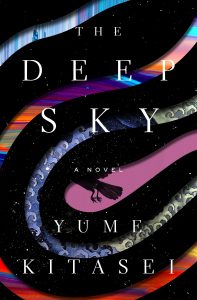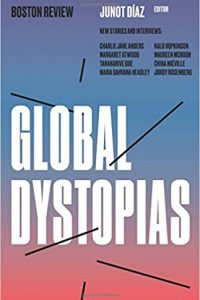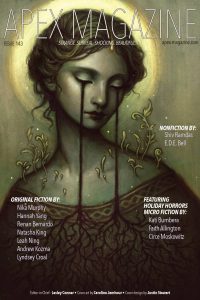Gabino Iglesias Reviews The Deep Sky by Yume Kitasei
 The Deep Sky, Yume Kitasei (Flatiron 978-1-25087-533-4, $29.99, 416pp, hc) July 2023.
The Deep Sky, Yume Kitasei (Flatiron 978-1-25087-533-4, $29.99, 416pp, hc) July 2023.
Yume Kitasei’s The Deep Sky is three books wrapped into one. At once a locked-room (locked ship, in this case) whodunit, an interstellar adventure that discusses a very plausible future, and a story that explores mother-daughter relationships as well as friendship, The Deep Sky is a very timely science fiction narrative that looks at some of the dark things humans can’t seem to leave behind no matter what.
The Earth is about to collapse due to environmental disaster. With the planet on what seems like its last leg, the world comes together to send a ship across space so humanity can start from scratch on another planet. After a very rigorous process that lasts for years, eighty students from across the world are selected for the mission. After a decade frozen, they will wake up and start working. They will all become pregnant and give birth to a generation of children that will be tasked with carrying forward humanity. There are a lot of risks involved, but the entire planet is behind the mission and only a few small radical groups want it to fail. Unfortunately, the mission and the ship are thrown off course when a bomb kills three crew members and pushes The Phoenix off course.
Asuka Hoshino-Silva, a young biracial woman who wasn’t originally selected to be on the ship, almost died in the explosion because she was out of the ship checking on the anomaly they thought was a bomb. Asuka, who is obsessed with birds and is haunted by the death of her little brother and the way she fought with her mom because she didn’t want her to be part of the mission, is an ‘‘Alternate,’’ which means she helps wherever she’s needed instead of having a specific job. In the aftermath of the explosion, Asuka is tasked with finding the culprit, and while there are only 80 possibilities, the job turns out to be much harder than she expected. What follows is a tense narrative about an investigation, a crew full of secrets, and a ship in turmoil that’s racing against the clock to get back on track with limited options and a broken AI that can’t help them.
The Deep Sky is an impressive debut. The novel is a mix of hard science fiction and crime/mystery. It also goes back and forth in time to show what Asuka went through while in the program to join the mission. That part reads like a YA novel about friendship and familial drama. The different elements work well together, and while I found the third part of the novel a bit long, the narrative always moves forward, and Kitasei manages to deftly weave together a few subplots while never straying from the mystery at the core of the story.
There are a lot of things to like here. The DAR – ‘‘Digitally Augmented Reality’’ – everyone uses allows people to ignore their reality almost all the time, which leads to some very interesting situations and, in a way, complicates Asuka’s investigations. Also, the ship is run by an AI named Alpha that, much like Arthur C. Clarke’s Hal 3000, morphs into an important character and forces readers to question the use of AI. Asuka’s obsession with birds runs throughout the entire story, occupying its own chapters, and eventually a very important place in the mystery, which was a unique approach. Lastly, the wonderful diversity present in this book merits attention. Ladies and nonbinary youngsters from across the world share the ship, and the multiplicity of identities, languages, and cultures is very rich. Kudos to Kitasei and her editor for putting Japanese in the novel without otherizing it with italics.
While there is a lot to like in The Deep Sky, there are also two small flaws that must be mentioned. The first is that the entire narrative circles around a handful of crew members, which means that around 70 people aboard the ship are basically nonexistent in the novel. All those people were suspects for a while, so seeing more of them would’ve helped make the narrative even more complicated. Also, Alpha is a presence… and then not really a presence… and then it comes back again but in no significant way. The AI could’ve been a superb vehicle to deliver some commentary, but the story never delivers on the promise it makes in the first third of the book.
Despite those small flaws, The Deep Sky is a very engaging read. It’s also a strong debut that announces the arrival of a talented new voice in science fiction that isn’t afraid to tackle timely topics while delivering an entertaining story.
Gabino Iglesias is a writer, journalist, professor, and book reviewer living in Austin TX. He is the author of Zero Saints and Coyote Songs and the editor of Both Sides. His work has been nominated to the Bram Stoker and Locus Awards and won the Wonderland Book Award for Best Novel in 2019. His short stories have appeared in a plethora of anthologies and his non-fiction has appeared in the New York Times, the Los Angeles Times, and CrimeReads. His work has been published in five languages, optioned for film, and praised by authors as diverse as Roxane Gay, David Joy, Jerry Stahl, and Meg Gardiner. His reviews appear regularly in places like NPR, Publishers Weekly, the San Francisco Chronicle, Criminal Element, Mystery Tribune, Vol. 1 Brooklyn, the Los Angeles Review of Books, and other print and online venues. He’s been a juror for the Shirley Jackson Awards twice and has judged the PANK Big Book Contest, the Splatterpunk Awards, and the Newfound Prose Prize. He teaches creative writing at Southern New Hampshire University’s online MFA program. You can find him on Twitter at @Gabino_Iglesias.
This review and more like it in the November 2023 issue of Locus.
 While you are here, please take a moment to support Locus with a one-time or recurring donation. We rely on reader donations to keep the magazine and site going, and would like to keep the site paywall free, but WE NEED YOUR FINANCIAL SUPPORT to continue quality coverage of the science fiction and fantasy field.
While you are here, please take a moment to support Locus with a one-time or recurring donation. We rely on reader donations to keep the magazine and site going, and would like to keep the site paywall free, but WE NEED YOUR FINANCIAL SUPPORT to continue quality coverage of the science fiction and fantasy field.
©Locus Magazine. Copyrighted material may not be republished without permission of LSFF.







